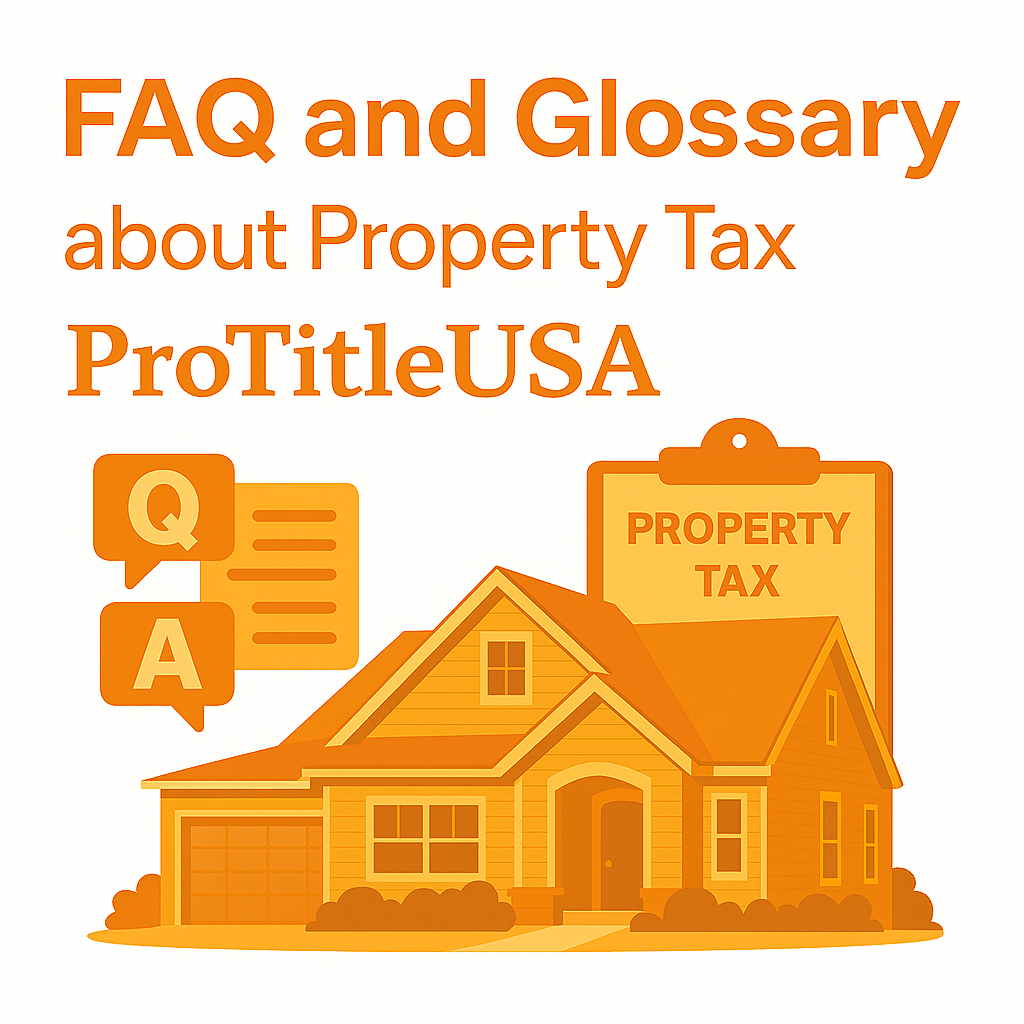Property Tax Search: Frequently Asked Questions & Glossary
Understanding property taxes
Understanding property taxes is an important part of owning, buying, or selling real estate. Whether you're trying to confirm if taxes are current, wondering what a tax certificate includes, or sorting out the difference between a tax report and a title report, having clear answers can help you avoid costly surprises. Below are quick answers to some of the most common property tax questions.

What is the difference between a tax report and a title report?
A title report or property ownership report is a comprehensive record of the legal status of the property’s ownership and any issues that could affect the title. It includes items such as the current owner, legal description of the property, tax status, recorded mortgages/deeds of trust, easements, restrictions, judgments, clouds on title, etc. A title report is generally used by buyers, lenders, and title insurers to ensure the property has clear, marketable title.
A tax report strictly focuses on the current and past taxes due on the property and does not include the remainder of items found in a title report. A real estate tax report is generally used by buyers, sellers, and lenders to verify that property taxes are current, and identify unpaid property taxes.
Key Differences:
| Feature | Title Report | Tax Report |
|---|---|---|
| Focus | Ownership and title status | Tax status |
| Show Liens? | Yes (all types, including tax liens) | Only tax liens or unpaid taxes |
| Legal Ownership? | Yes | No |
| Prepared by | Title company | Title company or tax service provider |
What does a property tax certificate include?
A property tax certificate is an official document that provides detailed information about a property's tax status. It is typically issued by a local tax authority (like a county treasurer or assessor) or a certified tax service provider. Here's what it usually includes:
- Property Identification
- Parcel number (also known as APN or PIN)
- Legal description of the property
- Property address
- Owner Information
- Name of the current property owner (as per tax records)
- Tax Status / Municipal Tax Records
- Current tax year’s bill: amount due or paid
- Breakdown of charges (general property taxes, voter-approved bonds, special assessments, etc.)
- Real estate tax payment history: dates and amounts of past payments
- Delinquent taxes: if any exist, including interest and penalties
- Prepaid taxes: if taxes have been paid in advance
- Outstanding balances: amounts still owed
- Taxing Authorities
- List of taxing districts or agencies receiving portions of the tax (e.g., school districts, water districts)
- Due Dates
- Installment due dates (varies by location)
- Grace periods and penalty dates for late payments
- Certifications/Guarantees (if applicable)
- Official stamp or signature from the issuing authority
- Statement certifying the accuracy of the tax data as of a specific date
How do I check unpaid taxes on a property?
There are several ways to do a tax parcel search.
- Online Property Tax Search on the County Tax Assessor or Treasurer Website
Most counties have an online portal for tax records. You'll need to know the property address or the parcel number.
What you’ll find:
- Current and past tax bills
- Payment status
- Due dates and penalties
- Any delinquent taxes (keep in mind that penalties and interest are not always included on treasurer websites)
- Contact the County Tax Collector or Treasurer
If online tools are limited, call the office directly to inquire about the property’s tax status.
- Any unpaid taxes
- Late fees or penalties
- Whether a tax lien has been recorded
- Request a Property Tax Certificate or Tax Status Report
- Request it from the county for an official record
- Ask a title or escrow company to pull one for you (especially during a real estate transaction)
- Use a Title Company or Tax Service Provider
If you're buying or selling a home, the title or escrow officer will typically order a tax report or tax certificate as part of due diligence. This will identify any unpaid taxes and flag tax liens or payment plans.
- Check for Tax Liens
Even if a bill appears to be paid, check the county recorder’s office (often a separate department) for any recorded tax liens and special assessments which can affect property transfers.
Are online tax records accurate and up to date?
Online tax records are generally accurate and up to date, especially when accessed directly from the official county tax assessor or treasurer’s website. Most counties update their systems regularly, often daily or weekly, to reflect payments, assessments, and delinquencies. However, here are a few important notes:
When Online Tax Records Are Reliable
- You're using the official county website, not a third-party site.
- You're looking at property tax information, not just assessed values.
- The site shows payment history, due dates, and balances clearly.
When to Double-Check
- Recent payments may not show immediately if there’s a processing delay.
- If the property is involved in a sale or refinance, always confirm through escrow or a title company.
- Some counties have limited online access or only update records periodically.
- If a good through date is not provided, the delinquent amount may not include penalties or interest.

Do I need a county tax report for refinancing or buying real estate?
Yes, you typically do need a tax report when refinancing or buying real estate, though you may not need to order it yourself.
When Buying a Property: A tax report is usually ordered by the escrow or title company during the transaction. It verifies that property taxes are paid and current; identifies delinquent taxes, tax liens, or special assessments; and ensures the buyer doesn’t inherit any unpaid tax debts. It’s a standard part of due diligence and protects both the buyer and the lender.
When Refinancing: Lenders require confirmation that property taxes are paid up to date, and that there are no tax delinquencies that could affect the refinance. The tax report gives the lender assurance that the property is in good standing and won't be subject to tax-related foreclosure.
In short, you don’t have to request a tax report yourself, but it is required and will be handled by your lender, escrow officer, or title company as part of the process.
How often are property tax records updated?
Tax records are generally updated on a regular basis; however, there is not a set timeframe for how often each tax collector updates their records. It is best to call the collecting agency directly to confirm the most up-to-date information.
Property Tax Glossary
The below real estate tax glossary includes some of the most common terms, property tax definitions, and tax record terminology. It’s designed to explain these concepts in plain language, making it easier to understand property taxes, assessments, and the details found in tax records.
- Assessed Value: This is the dollar amount the tax assessor assigns to your property. It’s used to calculate how much property tax you owe.
- Appraised Value: The estimated market value of your property, usually determined by a professional appraiser. It helps figure out the assessed value.
- Millage Rate: This is the tax rate used to calculate your property tax. It’s expressed in “mills,” where 1 mill = $1 of tax for every $1,000 of assessed value.
- Tax Parcel ID: A unique number assigned to your property by the county to identify it for tax purposes. Think of it as your property’s “tax ID.”
- Tax Lien: A legal claim placed on your property if you don’t pay your property taxes. It means the government can collect what you owe by selling the property if needed.
- Tax Certificate: An official document showing your property’s tax status, like what taxes have been paid or if any are overdue.
- Tax Roll Data: A list or record kept by the county that shows all taxable properties and their assessed values, used to calculate taxes.
- Property Assessment Report: A report showing details about how your property was assessed for tax purposes, including its value and any exemptions.
- Real Estate Tax Statement: The bill you receive from the tax authority showing how much property tax you owe for the year.
- Delinquent Taxes: Property taxes that haven’t been paid by the due date.
- Homestead Exemption: A special reduction in your property’s assessed value if it’s your primary home, which lowers your tax bill.
- Special Assessment: An extra charge added to your property tax for improvements or services benefiting your property, like sidewalks or streetlights.
- Tax Authority: The government body (like your county or city) responsible for collecting property taxes.
- Legal Description of Property: A detailed, official way of describing your property’s boundaries and location, often used in deeds and tax records.
- Tax Due Date: The deadline by which your property tax payment must be made to avoid penalties.